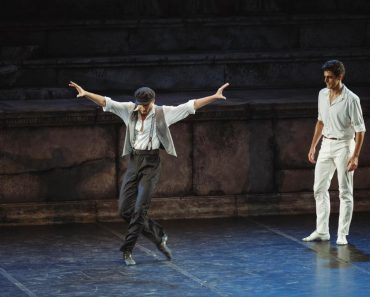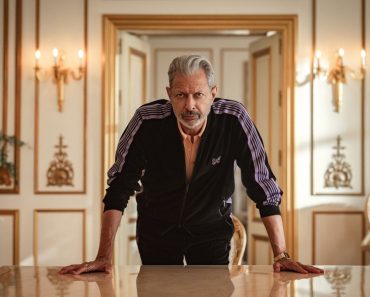(SOUNDBITE OF MUSIC)
GLEN WELDON, HOST:
In the clever and often funny new Netflix series “Kaos,” the Greek gods are a rich and powerful modern-day family. They’re led by an impulsive and deeply insecure Zeus played by Jeff Goldblum. He’s insecure, but he’s not paranoid because there really is a plan to overthrow him – a plan that depends on a slew of gods, demi-goods, and mortals working together, whether or not they happen to be aware of the specific roles they each are playing. I’m Glen Weldon, and today, we’re talking about “Kaos” on POP CULTURE HAPPY HOUR from NPR.
(SOUNDBITE OF MUSIC)
WELDON: Joining me today is Regina Barber. She’s a host and reporter for NPR’s science podcast, Short Wave. Hey, Regina.
REGINA BARBER, BYLINE: Hey. I’m excited.
WELDON: So am I. Also here with us is entertainment journalist Cristina Escobar. She’s the co-founder and editor-in-chief of Latina Media punto co. Hello, Cristina.
CRISTINA ESCOBAR: Hello, thanks so much for having me back.
WELDON: Of course. And rounding out the panel is entertainment journalist and contributor Shar Jossell. Welcome back, Shar.
SHAR JOSSELL: Hi. Thanks for having me. So excited to be here today.
WELDON: Of course, let’s do it. In “Kaos,” Jeff Goldblum plays a squirrely, vengeful, track suit-wearing Zeus. He lives on Mount Olympus with his wife Hera, played by Janet McTeer. He also keeps his old friend Prometheus, played by Stephen Dillane, as his prisoner, but as the show kicks off, he’s almost forgiven the guy. Little does Zeus know that Prometheus has been working on a plan for centuries to overthrow him.
(SOUNDBITE OF TV SHOW, “KAOS”)
STEPHEN DILLANE: (As Prometheus) I’m lying to Zeus. The prophecy can come to pass. He can absolutely be destroyed. And if certain people open their eyes, he will be.
WELDON: That plan involves Zeus’ son Dionysus, played by Nabhaan Rizwan, as well as the mortal rock star Orpheus and his wife, Eurydice or Riddy. They’re played by Killian Scott and Aurora Perrineau. All eight episodes of “Kaos” are streaming now on Netflix. Shar, let me kick off with you. This is a weird one. Talk to me about it.
JOSSELL: Yeah. You know, this was very, very camp. I’ll start there. This was a very niche and camp series. Gore aside, ’cause I’m not really a big fan of blood, guts and gore…
WELDON: I got you.
JOSSELL: …I could have ultimately done without this. I felt like it could have been reformulated. Like, I would have loved to have watched this series from the furies and the fates’ perspective because they were the most entertaining to me how they were, like, rolling up and wrecking shop. And so the performances were great, the story was a bit too all over the place for me to say that I absolutely emphatically loved this series.
WELDON: OK. There is a lot here. That’s certainly true. Regina, how about you?
BARBER: I agree with Shar that I don’t know if I’d watch it again. I was engaged, especially, I think, after, like, the second or third episode. But I closed my eyes at least once, you know, in every single episode because it was just too bloody. And that really took me out of the story a lot of the time. And I agree with Shar that just the writing was weird.
(LAUGHTER)
BARBER: There’s so many love situations, like parent and child love, or, you know, partners or, like, sibling love – didn’t seem real. And except for, like, maybe, like, one, but a lot of the relationships just seemed so not believable.
WELDON: OK. Cristina, what about you? What’d you think?
ESCOBAR: No.
(LAUGHTER)
ESCOBAR: I thought just no on this show. I want to say, I love Greek myths. I watch all of this stuff. I read all of the books. I went and saw Madeline Miller talk in person about “Circe.” I’ve given that book as Christmas presents.
WELDON: Sure. Sure.
ESCOBAR: Me and the kids were reading “Percy Jackson.” Like…
BARBER: Wow.
ESCOBAR: …This is my jam. And I just couldn’t. I felt like by the fourth episode – so just shy of halfway through – there was finally something enough happening that I was like, OK, I see I can root for some people here. Something is going on. But for most of it, I just felt like it really meandered. The characters didn’t gel. A lot of it didn’t make sense, even knowing the mythology. And also…
BARBER: Yeah.
ESCOBAR: …I’m not a person who cares if you take liberties. Like, I liked “My Lady Jane.”
WELDON: OK.
ESCOBAR: But this show didn’t make sense. There wasn’t, like, any internal logic to it. I felt like I love Jeff Goldblum, but he felt miscast to me. I didn’t get a sense of power behind him, just neurosis.
(SOUNDBITE OF TV SHOW, “KAOS”)
JEFF GOLDBLUM: (As Zeus) Am I likeable? Do people like me? Do they not seem to take to me?
ESCOBAR: And I didn’t get a sense of evil, too, which made some of the things not make sense. And then also, while there was a lot of gore, a lot of it also happened, like, just off screen. Like, maybe if we had, like, I don’t know, seen lightning bolts shoot out of him or something, it might have felt a little bit more real…
JOSSELL: Yeah.
ESCOBAR: …But it all just felt contrived – contrived and nonsensical to me.
WELDON: I think I come down to this a little bit more positive than y’all. I mean, look, the premise here is not new – Greek gods but make it modern. That is a very familiar premise. One might even say it’s a classic – classical premise. So I expected a lot of, you know, oh, who’s this guy with one eye? I bet that’s Polyphemus. Who’s this person saying, you know, that there’s disaster? I bet it’s Cassandra. And you get a lot of that in the beginning, and it started off and it felt very familiar. You know, and people are comparing it to Neil Gaiman, of course, “American Gods,” “Sandman.” But one thing I would say is that Neil Gaiman didn’t invent any of that. Like, lots of fantasy literature and video games, if any of you all played Hades.
BARBER: I was just going to say, the only reason I understood this series is because I played Hades obsessively for a long time…
WELDON: There you go.
BARBER: …Last year.
WELDON: OK. But I think if this series only had introed the Western Easter eggs, cutesy references, callouts, I think there’s a lot more in the tank here because the show is, as you mentioned, it’s weird. It’s a weird show. I think it’s often a very funny show. It is doing its own thing. So its take on Orpheus and Eurydice, of course, you know, that is a tale that gets told and retold, myth blah, blah, blah, blah, blah. But we are still living in the immediate shadow of “Hadestown.” That is a phenomenon that has a big, cultural footprint. And I was worried that it wouldn’t be able to step out of the “Hadestown” shadow.
But I needn’t have worried because it’s – this show was so specific enough and weird enough that I kept wanting to watch it. And I, for one, liked the way the plot worked, because this plot was not – in a way that a lot of streaming series are – kind of like a train track, and you stop at the different train stations, right? This was more – this was not like this happened, this happened, this happened. It was more this happened because this happened, which caused this to happen. So it was more like a mesh, more like clockwork. Now, there are some characters and storylines that are completely outside of it, which I think y’all are reacting to, which we can talk about. But this show does a lot. There are a lot of characters. There’s lots of themes. And every so often, we’d come up against a plotline that kind of felt like it was not connected to the whole. We get a whole thing about occupied nations and refugees.
JOSSELL: Yep.
WELDON: Did any of that stuff kick you out? Did any of that stuff not feel like it fit into the mix?
JOSSELL: So the things that felt like they didn’t fit in to me as I was watching this series – by the time I got to the finale, everything was like, tied up and – I’m using air quotes – like, “made sense” ’cause I’m like, OK, well, who is this?
BARBER: Yeah.
WELDON: Yeah.
JOSSELL: And why did he do this to himself? And why did she do that to her? And then it was like, oh, the tangled webs we weave, you know, like…
ESCOBAR: Yeah.
JOSSELL: …By the time I got to the end. But, yeah, there were a lot of themes, you know, that are on par with a lot of the things going on in the real world in real time. You know, if you squint and looked past it on the surface, there were just – it felt like a call to the real-time news cycle…
WELDON: Right.
JOSSELL: …In more ways than one for me. So…
ESCOBAR: I thought that, like, the politics around Crete and Troy was actually kind of interesting. Like, that made…
WELDON: OK.
ESCOBAR: …Enough sense. But the politics around Riddy and her gender struggle to find herself was nonsense.
BARBER: No. Boo.
ESCOBAR: Boo.
(LAUGHTER)
ESCOBAR: It did not make…
BARBER: Boo.
ESCOBAR: …Any sense. And I think they were trying to make it so we would root for them separately but not as a couple. But it just made me dislike both of them. I mean, eventually, I came around on Riddy once she got, like, far enough away from Orpheus, but it just felt like, why are we spending so much time with these bored, rich people who don’t care about each other and can’t talk to each other?
BARBER: Yeah, this whole thing where she’s like, I feel trapped in this mansion where I’m not actually being controlled, and no one’s stopping you from making any dreams of your own, but somehow you can’t have dreams of your own, like, I wanted to root for her so bad. But she just – her character was just so boring.
ESCOBAR: Her backstory sucked.
JOSSELL: Yeah, it did. It did.
WELDON: Yeah, and it was a great house. I wouldn’t want to leave that house. I guess the reason we keep telling these stories over – and these myths over and over again is because they’re centered on human emotions – right? – so falling out of love, feeling ignored by your parents or whatever, feeling jealous, revealing family secrets. It’s when we get a plot thread that’s more overtly political, like the refugees of the Crete versus Troy stuff, that I felt like we were once removed from where we needed to be for this to work, right?
And I also thought that was true in the whole Ariadne plotline. That’s Ariadne played by Leila Farzad. She is the daughter of Minos, the king of Crete. I just thought that plotline kind of hung out there, didn’t really enter into the mix, didn’t really gel with everything else.
BARBER: That was a good storyline. That one I liked.
WELDON: See, I didn’t think that connected.
JOSSELL: That was my favorite…
WELDON: Talk to me about this.
JOSSELL: …Out of the whole series.
WELDON: Talk to me about this ’cause I didn’t think it connected to anything else that was going on.
JOSSELL: It didn’t.
(LAUGHTER)
BARBER: OK, so I think that we are talking about this, like, falling out of love, like, having disagreements with your parents. Yes, those are all real, but for some reason, they were written in a way that was so surface and shallow and, like, wasn’t substantial for me. But somehow, this character, Ari, and her connection with her father and her distance from her mother, all of that seemed very real, even till the very end, even that reveal of, like, the prophecy, the twist of the – even that was good. I feel like that chunk in this whole series was the most concrete, deep and complete.
JOSSELL: When I zoomed out, that was my favorite storyline because I found it to be by far the most compelling out of everything…
BARBER: Yeah.
JOSSELL: …That was presented to us, especially in relationship to, like, the humans and the gods.
BARBER: Yeah.
JOSSELL: And, you know, her father’s betrayal and just discovering – like, when I discovered that – I wish I could remember the name of the monster. Was it, like, the Minotaur?
ESCOBAR: The Minotaur.
BARBER: Yeah.
WELDON: Yeah.
JOSSELL: The Minotaur.
WELDON: Minotaur.
BARBER: Yeah.
JOSSELL: OK. That makes me think of “True Blood.” But (laughter)…
ESCOBAR: Where do you think they got it from?
JOSSELL: When I think of that character and, like, the reveal of it being, you know, her brother and even, like I said, the campiness of the Furies showing up, and, you know, the popcorn’s ready, and they’re making her watch this show to let her know, you know, what’s going on…
WELDON: Yep.
ESCOBAR: That was so good.
JOSSELL: I loved it. I loved it (laughter).
WELDON: See, I kept wanting to go back to Olympus, me, because I love seeing Janet McTeer as Hera.
JOSSELL: Oh, yes.
WELDON: It took me a while to recognize…
JOSSELL: Yes.
WELDON: …Stephen Dillane, who plays Prometheus. He played Stannis Baratheon on “Game Of Thrones,” and his affect here is so different from Stannis Baratheon. And every time he’s on screen – I don’t know what it is about that actor or the actor in that role – he just seemed so sweet in his little ’70s red tennis shorts – just like, oh, what a sweetie. But let’s talk about Zeus, ’cause we have to ’cause this show revolves around him.
JOSSELL: Ugh.
WELDON: He was originally going to be played by Hugh Grant.
JOSSELL: Yeah.
WELDON: That was the original casting. Hugh Grant had to drop out because of a scheduling conflict. That would have been great. It would have been a very different show because I think Goldblum – unlike y’all, I think Goldblum fit this well. He’s odd. He’s squirrelly. But he’s not like latter-day Goldblum, like we’ve been getting in, like, “Thor: Ragnarok.” He’s not all ticks and mugging. He’s Goldblum, but he’s Goldblum at about a six – right? – which is good because then when he’s called upon to be ruthless and calculating and evil, he can make that pivot. I thought he made that pivot.
BARBER: I actually personally was afraid of him.
WELDON: Yeah.
BARBER: So it was the first time I had seen Jeff Goldblum in a role that I felt was – like, he was playing a villain and was terrifying.
JOSSELL: Yeah.
(SOUNDBITE OF TV SHOW, “KAOS”)
GOLDBLUM: (As Zeus) You’re an ambitious little weasel.
JANET MCTEER: (As Hera) Zeus. Zeus.
GOLDBLUM: That’s what you are, aren’t you? You never liked that I just gave you death. You always felt like you deserved more than that, but you’re the runt, Hades. You’re where you belong (shouting) down in the dark.
JOSSELL: Yeah, he’s not likable or sexy in this role.
BARBER: Yeah, it’s true.
JOSSELL: Normally, I’m like, OK, Jeff (laughter). He was just so just callous. And there was part of me like, this is a bit intense, and it’s making me not like Jeff Goldblum. That’s how I know he’s doing his job.
WELDON: (Laughter).
JOSSELL: Although I have issue with the writing, I thought that the performances were pretty solid.
ESCOBAR: Yeah, I felt like he got a disservice by his character’s motivation not really making sense, right? Like, so all the other gods kept saying, why do you care about this? You’re the – it’s beneath you. You’re the king of gods, you know? And he didn’t really ever have an answer for that.
BARBER: I think the writers tried to fix that problem at the very end when they’re like, but you ate your father, so you’re acting like your father. And then they used it as the, like, conclusion for the rest of it. And I agree that that wasn’t good enough.
ESCOBAR: I like Jeff Goldblum, but I felt like this was a strange use of him and that maybe had the script been stronger, he would have been better set up to work for me as a villain. You know, I thought Hera was great. Like, she owned…
BARBER: Yeah.
JOSSELL: Yes.
ESCOBAR: …Like, power and evil and sexy and, like, all this stuff, right?
JOSSELL: (Laughter).
ESCOBAR: And I just, like – that I really bought, but in a way where I was like, I would be scared of her. I was just, like, confused by him.
(SOUNDBITE OF TV SHOW, “KAOS”)
MCTEER: (As Hera) You really are losing your mind. Do you know that? I have devoted myself to you, to your tantrums and your desires and your rage and your fear. I swallow it all for you. I eat your pain. Now, I could have taken…
JOSSELL: She was my favorite…
ESCOBAR: She was good.
JOSSELL: …Out of all of the performances of the Greek gods.
WELDON: She was definitely my favorite, too. Well, the creator of the show, Charlie Covell, they’ve said that the jumping-off point for the show was what if Zeus – what if a god had a midlife crisis? And that is a jumping-off point that they kept jumping off of and not really digging into…
BARBER: Yeah.
WELDON: …If that makes any sense. Like, that was the triggering thing, but it didn’t get really explored. Did any of y’all think that they criminally underused Hades and Persephone? That’s David…
ESCOBAR: Yes.
WELDON: …Thewlis and Rakie Ayola.
ESCOBAR: Yes.
WELDON: We needed more of them. We get some of them at the end but not enough of them. They should have been sprinkled throughout.
JOSSELL: Yeah. Aside from that, like, they were definitely underutilized, but I also wanted some of, like, the female characters to be present. Like, there was mention of, like…
WELDON: Yeah.
JOSSELL: …Aphrodite and Athena. And I’m like, why isn’t this, like, a well-rounded cast? If we’re going to tap on the shoulders of Greek mythology and the Greek gods, I need to see some of the faves – my faves that I grew up reading about. So yeah, I would have loved to have seen, you know, some of the girls – I don’t know – like, show up and do what they had to do.
WELDON: I so agree with you. I kept wondering, how would Athena fit into this world, this tracksuited, you know, ’70s…
JOSSELL: Right. Right. Right.
WELDON: …Cheesy Italian villa world? How would it – how would she fit into this? All right. Can we move on to talking about the ending or lack of same? So spoiler warning – probably all out there. If you’re thinking about getting into this show, this has the classic streaming series ending that we’re all getting in 2024 where the story kind of stops. It doesn’t end. It doesn’t resolve. It just stops. And it’s not a kind of leave the story open in case we get a second season. It’s like, we’re betting we’re getting a second season, and we’re going to leave things deliberately unresolved. How did that land on y’all?
JOSSELL: I hated it (laughter).
ESCOBAR: I hated it, too.
WELDON: Yeah.
JOSSELL: I did not enjoy it. What I will say is that, aside from leaving an open-ended ending, I do like that in that final episode, so many of my questions were answered as far as, like, who is that? Why are they doing…
WELDON: Yeah.
JOSSELL: …This? And where are they going? Like, everything was somewhat answered. So that felt like a conclusion. But the open-ended ending I didn’t appreciate because…
BARBER: Yeah. It was not enough.
JOSSELL: You can’t bank on getting a second season, especially in this climate, you know.
WELDON: Absolutely.
JOSSELL: And in the event that you do, you know, then you refresh the story and do what you have to do. But cliff-hangers are not – and I wouldn’t even say that this was necessarily a cliff-hanger. Like you just mentioned, Glen, it just was – the story was unresolved in so many different ways, and I’m not a fan of that.
ESCOBAR: Well, and I will say, too, like, it’s a lot of work to watch the show, right? There’s a lot of characters you have to learn or you’re, like, switching between settings. They do some great cinematography to help with that, but, like, it’s a lot of work. It’s a lot of you have to pay attention and follow all these different plots.
JOSSELL: Yes.
ESCOBAR: And then for there not to be a, like, resolution or a payoff, I was like, man, I just did a lot of work for nothing. Like, nothing…
WELDON: (Laughter).
ESCOBAR: …Resolved. And I felt like that was really frustrating, especially after having asked so much of me.
WELDON: All right. Is there anything else you want to hit that we have not covered yet? Anything you want to touch on?
ESCOBAR: I want to say, I’m fine with people taking liberties with the myths. I think you have to, and I think that’s what makes it fun. But I felt like this was strange in how they did it in terms of, like, being very consistent for most of it and then every once in a while throwing a weird curve that, to me, it made it not coherent as a series…
WELDON: Yeah.
ESCOBAR: …To have it be, like, straight true myths for six, seven episodes and then being like, oh, we’re actually going to have this totally different origin story of their power. I was like, what?
JOSSELL: Because they certainly made it – the show is also, you know, very queer in a lot of ways, even with some of the casting…
WELDON: Certainly.
JOSSELL: …Which I enjoyed. But when I…
WELDON: Yeah.
JOSSELL: …Think about Greek mythology, it’s all of that, all…
BARBER: It’s – yeah.
JOSSELL: …You know, all of the stories and some of the overlapping. And so that is one aspect that I did enjoy with seeing how queer this show was, but it’s really not at the same time. So…
ESCOBAR: Greek mythology actually is pretty queer. They had a lot of gay plotlines…
WELDON: Certainly true.
ESCOBAR: …And, like, a lot of those pieces…
BARBER: Definitely.
ESCOBAR: …And maybe not what you read in, like, high school. But if you get to college, man…
WELDON: (Laughter).
JOSSELL: And gender bending.
WELDON: Certainly true.
ESCOBAR: That I was, like, totally into.
JOSSELL: (Laughter).
ESCOBAR: But, like, some of the liberties they took, it just didn’t help.
BARBER: It’s just trying to do so much, and, like, I think maybe if it just pulled back for a little bit, it could have worked.
WELDON: All right. Well, this was a really great discussion because I wasn’t sure what to make of this thing. I have a better sense now of what to make of it ’cause y’all helped me kind of figure out where my head’s at. We want to know what you think about “Kaos.” Find us at facebook.com/pchh. That brings us to the end of our show. Regina Barber, Cristina Escobar, Shar Jossell, thank you so much for being here.
JOSSELL: Thank you for having us.
BARBER: Thank you so much.
ESCOBAR: Thank you.
WELDON: And just a reminder that signing up for POP CULTURE HAPPY HOUR+ is a great way to support our show and public radio, and you get to listen to all of our episodes sponsor-free. So please go find at more at plus.npr.org/happyhour or visit the link in our show notes.
This episode was produced by Liz Metzger and edited by Mike Katzif. Our supervising producer, of course, is Jessica Reedy, and Hello Come In provides our theme music. Thank you for listening to POP CULTURE HAPPY HOUR from NPR. I’m Glen Weldon, and we’ll see you all tomorrow.
(SOUNDBITE OF MUSIC)
Copyright © 2024 NPR. All rights reserved. Visit our website terms of use and permissions pages at www.npr.org for further information.
NPR transcripts are created on a rush deadline by an NPR contractor. This text may not be in its final form and may be updated or revised in the future. Accuracy and availability may vary. The authoritative record of NPR’s programming is the audio record.







